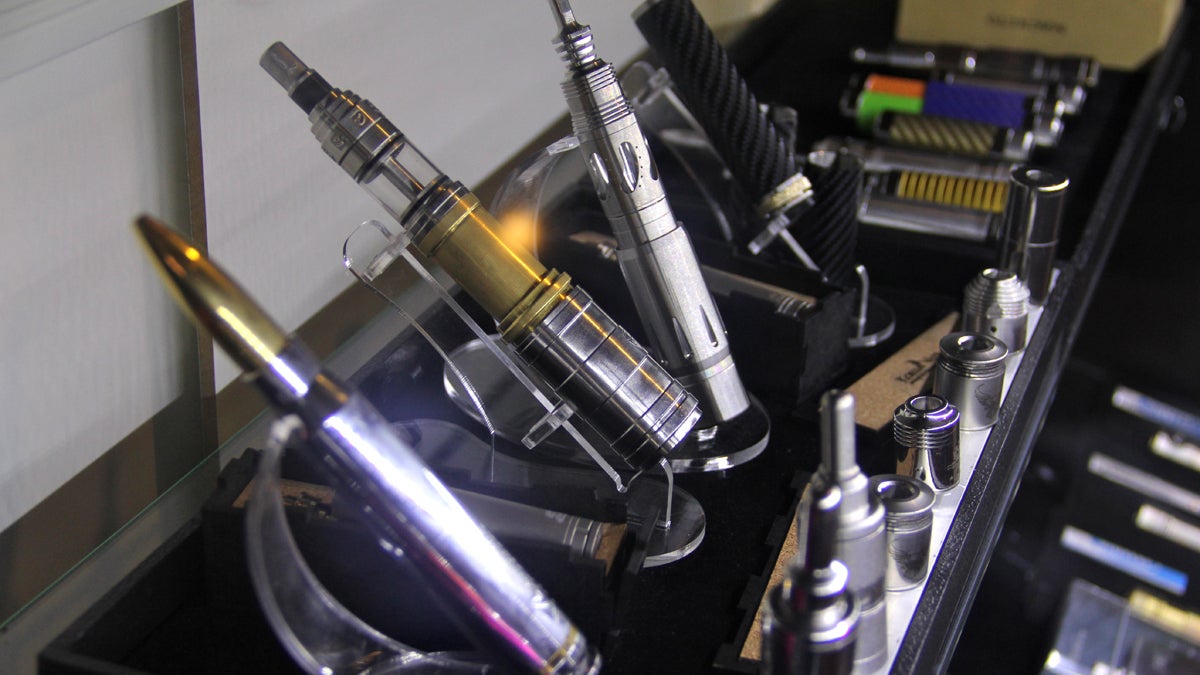N.J. bill would extend tobacco tax beyond e-cigarettes to cigars, other products

Electronic cigarettes or vaping devices range in price from about $50 to more than $200. A new bill in New Jersey would extend tobacco taxes to devices such as these. (Emma Lee/for NewsWorks)
Legislators are interested in expanding Gov. Chris Christie’s proposal to tax electronic cigarettes at the same level as conventional cigarettes to other tobacco products, like cigars and smokeless tobacco.
The bill (S-1867), is drawing strong opposition from e-cigarette and tobacco producers, wholesalers, and retailers, as well as consumers who say they use e-cigarettes to quit smoking.
But public health advocates say boosting the tax would both discourage use of harmful products and raise revenue for smoking cessation programs.
Both sides of the debate are trying to use uncertainty about e-cigarettes to their advantage. Supporters of the bill say that some harmful effects are already known and others could be found. Bill opponents say they’re clearly less harmful than regular cigarettes.
State officials say that Christie’s proposed tax increase just on e-cigarettes would yield $35 million in the budget year starting on July 1, a number that’s disputed by tax opponents.
But the bill, sponsored by Sen. Joseph F. Vitale (D-Middlesex) and Sen. Richard J. Codey (D-Essex and Morris), would extend the tax to other tobacco products. This is expected to generate $22 million, which would be dedicated to smoking control, cessation and prevention programs; drug abuse treatment and prevention; and cancer research.
E-cigarettes are battery-powered and use heat to vaporize a liquid solution that generally includes nicotine and flavoring. State Health Commissioner Mary E. O’Dowd has said that the tax would be an effective way to reduce e-cigarette use, particularly among children.
It’s not clear whether the tax will make it through the budget process, however. While the state is in dire need of closing the budget deficit, several Democratic legislators have questioned the value of the proposal.
Several business advocates said increasing taxes on e-cigarettes and other tobacco products would have negative repercussions. Sal Risalvato, executive director of the New Jersey Gasoline-Convenience-Automotive Association, said gas stations have begun to rely on e-cigarette sales in recent years.
“They have always used tobacco products as an important profit center,” which would be threatened by the taxes, Risalvato said.
Ryan Bunting of the New Jersey Vapor Retailers Coalition — a group of 47 New Jersey retailers — said e-cigarettes were the only products that helped him quit smoking. The tax “is going to force many of us smaller shops to close our doors,” Bunting said.
The tax would be 75 percent of the wholesale price of e-cigarettes, which is equal to the $2.70-per-pack on cigarettes. Vitale said retailers might only bear some of the cost, since wholesalers could be responsible for a portion of the cost as well.
Greg Conley of the American Vaping Association, a national e-cigarette advocacy, , said there was no debate over whether e-cigarettes are less hazardous than regular cigarettes — just one over how much less.
But Vitale said some of the same concerns were raised by businesses when the state has increased the cigarette tax. He added that “if someone quit smoking because it’s too expensive . . . that’s OK with me.”
The American Cancer Society Cancer Action Network and the American Heart Association support the bill.
Corinne Orlando, a lobbyist for the American Heart Association, said the association supports all actions that reduce youths’ access to tobacco products. She said the lower prices of cigars and smokeless tobacco compared with cigarettes made them more attractive to high schoolers. She noted that New Jersey is the only state that doesn’t dedicate state funds to reducing smoking.
Vitale said it was important to equalize taxes on other tobacco products with cigarettes because some of those products are similar to cigarettes, such as cigarillos — short, narrow cigars. He also said it was an opportunity to support drug treatment and smoking cessation programs.
John Holub, president of the New Jersey Retail Merchants Association, urged legislators to take a cautious approach to increasing taxes, noting the findings of a state report that a large portion of cigarette sales has been pushed to the black market due to taxes.
Tom Briant, executive director of the National Association of Tobacco Outlets, said e-cigarette sales collapsed in Minnesota after the state became the only one that has a separate tax like New Jersey is contemplating.. He said this was likely due to residents purchasing the products online from other states.
This point was supported by Andrew Kerstein, owner of six Smoker’s Haven stores, who said the bill would put him “and virtually every other tobacco retailer in the state” out of business. And Aras Azuolas, owner of Bristol, PA,-based The Vapor Chef, said he would cancel plans to open five e-cigarette stores in New Jersey if the tax is enacted.
“You’re going to drive people back to smoking,” by raising the costs on a less-dangerous alternative, Azuolas said.
But Vitale said the nicotine in e-cigarettes is clearly addictive and the U.S. Food and Drug Administration does not treat the products as smoking cessation aids.
“While the science may be out on this, definitely we know that there is harm” caused by the products, Vitale said. While he said he didn’t want to harm business owners’ ability to earn a living, he added: “We have an industry that’s trying to fool us once again.”
The FDA recently proposed regulating e-cigarettes, cigars and other tobacco products in a similar manner to cigarettes.
Click through for more stories on NJ Spotlight.
WHYY is your source for fact-based, in-depth journalism and information. As a nonprofit organization, we rely on financial support from readers like you. Please give today.




